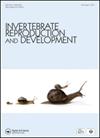Effects of nutritional stress on reproductive output in the scorpion Tityus pusillus Pocock, 1893 (Scorpiones, Buthidae)
IF 0.8
4区 生物学
Q4 REPRODUCTIVE BIOLOGY
引用次数: 1
Abstract
ABSTRACT Nutritional stress in females may have adverse reproductive effects such as reduced fertility and high juvenile offspring mortality. In this study, we investigated the effects of dietary stress on the reproductive output of the scorpion Tityus pusillus Pocock, 1893, in which we tested the hypothesis that compared with well-fed females, those subjected to nutritional stress would have a longer gestational period, produce offspring of lower weight, and suffer higher rates of mortality rates. Females were mated and divided into two treatment groups: those fed weekly (n = 37) and those fed on alternate weeks (n = 43). Compared with the well-fed females, we observed higher mortality (81.4% vs. 59.5%), a longer gestational period (21.3 vs. 12.7 weeks), and a larger number of offspring, albeit with higher mortality (8 and 64.1% vs, 3.5 and 45.2%, respectively) in the less frequently fed females. However, litter weights in both groups were found to be similar (less fed: 0.013 g; well fed, 0.014 g). These findings reveal that nutritional stress causes changes in the progeny of inadequately fed T. pusillus females, thereby contributing to higher offspring mortality, and indicate that T. pusillus females vary their reproductive strategies depending on resource availability.营养胁迫对天蝎生殖产量的影响(蝎目,蝎科)
雌性营养不良可能对生殖产生不利影响,如生育力降低和幼崽死亡率高。在这项研究中,我们调查了饮食应激对1893年Tityus pusillus Pocock蝎子生殖输出的影响,在研究中,我们验证了一个假设,即与营养充足的雌性相比,遭受营养应激的雌性会有更长的妊娠期,产生更低体重的后代,并且死亡率更高。雌性交配后分为两组:每周喂食(n = 37)和隔周喂食(n = 43)。与喂养充足的雌性相比,我们观察到更高的死亡率(81.4% vs. 59.5%),更长的妊娠期(21.3 vs. 12.7周)和更多的后代,尽管较少喂养的雌性死亡率更高(分别为8%和64.1% vs. 3.5%和45.2%)。然而,两组的窝重相近(少饲0.013 g;这些研究结果表明,营养应激会导致营养不足的雌性pusillus后代发生变化,从而导致后代死亡率更高,并表明pusillus雌性会根据资源的可用性改变其生殖策略。
本文章由计算机程序翻译,如有差异,请以英文原文为准。
求助全文
约1分钟内获得全文
求助全文
来源期刊
CiteScore
1.90
自引率
0.00%
发文量
21
审稿时长
>12 weeks
期刊介绍:
Invertebrate Reproduction & Development ( IRD) presents original research on the reproductive and developmental biology of the Invertebrata, both embryonic and postembryonic. IRD welcomes papers reporting significant results obtained using new techniques. Encouraged topic areas include: aquaculture, physiology, biochemistry, functional morphology, phylogeny, behavioural and regulatory mechanisms, including genetic, endocrine and molecular studies. Papers containing qualitative descriptions of reproductive cycles and gametogenesis will not be considered. IRD is published in association with the International Society of Invertebrate Reproduction and Development.

 求助内容:
求助内容: 应助结果提醒方式:
应助结果提醒方式:


